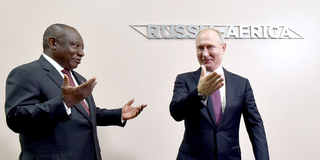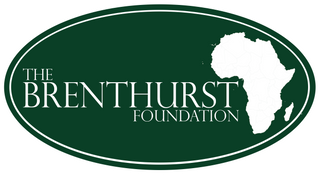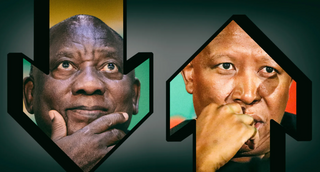News
To Russia With Love — Cyril Ramaphosa, South Africa’s Moscow Candidate
The Russian love affair would be consolidated in no fewer than 13 face-to-face meetings and phone calls between Ramaphosa and Putin over the five years of Ramaphosa’s presidency. Contrast this with just one visit to the US not related to the UN General Assembly sessions by Ramaphosa.

Director, The Brenthurst Foundation

Research Director, The Brenthurst Foundation


Less than a month after taking office as President in February 2018, Cyril Ramaphosa sent a message to Russia’s President Vladimir Putin, congratulating him on his “overwhelming victory” in elections, adding that this “demonstrated that the people of the Russian Federation have faith in the leadership of President Putin”.
It was, in retrospect, the first sign that Ramaphosa’s presidency was unlikely to be the hotbed of reform and modernisation that was expected as he took over from the hapless Jacob Zuma and promised a “new dawn”.
First, Putin’s “overwhelming victory” was dodgy. Russia is hardly a free and open society and, worse, there was evidence of systemic rigging.
Election statistician Sergey Shpilkin and others point to many anomalies. “Shpilkin and other experts,” writes Sergey Dobrynin, “analyse election data at the polling station level, which is officially published by the Central Election Commission [CEC]. One of the most eloquent parameters is turnout. For example, it may turn out that in some regions, at dozens of PECs [precinct election commissions], it turned out to be exactly the same, moreover, exactly equal to 70 percent. It is clear that such a ‘round’ value and an amazing coincidence in many areas at once is a sign of falsification.
“Probably, the ballots here were not counted at all, but simply provided the CEC with data on both the overall turnout and the voting results, which they themselves selected in advance. This is the most obvious type of anomaly, which purely mathematically proves falsification with high certainty.”
This did not, however, dull Ramaphosa’s enthusiasm for Putin. It may, in fact, have increased it, given the pending signs of a decline in ANC support.
The second sign came in May 2017 when Ramaphosa took an extraordinary step, appointing his then deputy, David Mabuza, as his “Special Envoy to the Russian Federation, where he will, among other things, meet with President Vladimir Putin in Russia.
“President Ramaphosa looks forward to further strengthening the already existing political, economic and trade ties between South Africa and Russia.”
Special envoys are usually reserved for conflict situations where governments feel they need eyes and ears on the ground. Appointing a “special envoy” — the deputy president, no less — to a specific country was unprecedented. There is, after all, a South African ambassador and embassy in Moscow that are supposed to take care of day-to-day interactions and other diplomatic exchanges.
Mabuza was to travel frequently to Russia, sometimes for weeks on end, to fulfil this mission as a “special envoy”. What exactly he carried to and fro in his diplomatic bags is not known.
In 2021, he spent a full month in Moscow, claiming he paid for the trip himself and it was for medical treatment. Asked in Parliament about the relationship between his trip and a possible deal with Russia regarding gas imports, he said the two were not related.
Looking back, it is now obvious that a major pivot in South Africa’s global positioning was under way and that Ramaphosa was determined to place Russia, already the subject of global opprobrium over its 2014 invasion of Crimea, at the centre of the diplomatic universe.
The Russian love affair would be consolidated in no fewer than 13 face-to-face meetings and phone calls between Ramaphosa and Putin over the five years of his presidency.
Contrast this with just one visit to the US not related to the UN General Assembly sessions by Ramaphosa.
Explaining the inexplicable
Why would South Africa — a country seeking to leave behind a fraught human rights history — take such extraordinary measures to enthusiastically build relations with a country that did not share its values and which was not a major trading partner?
Why would this relationship persist even when Russia launched its full-scale invasion of Ukraine in February 2022?
And why would the views of the South African people, most of whom believe Russia should be condemned for the invasion and that the country should associate itself with the West and other democracies rather than BRICS, be shunned in favour of this “special relationship”?
The following historical scenario might explain the otherwise inexplicable:
At the time of the transition from apartheid to democracy back in 1994, a large chunk of the ANC was in Moscow’s orbit, having been trained in the former Soviet Union, and with a strong fraternal relationship with Russia to whom the ANC perceived it owed a great deal.
Key individuals, including the likes of Essop Pahad and, later, Jacob Zuma were considered as Moscow’s men. Pahad, a lifelong communist, had lived in the Eastern Bloc between 1975 and 1985, then under the yoke of Soviet rule. Zuma, a senior ANC intelligence official “with extensive Soviet Bloc connections”, had received military training in the Soviet Union in 1978 after his release from Robben Island five years earlier, “a practice that was customary for senior ANC cadres”, note Andrew Weiss and Eugene Rumer.
The influx of younger cadres into camps in Angola and elsewhere in the region after the 1976 Soweto uprising saw the creation of Soviet and East German training missions in southern Africa, while Eastern Bloc support especially helped the ANC build its counterintelligence capabilities. Like the KGB, the first priority of ANC security was always to deal with the traitors in its midst, culminating in serious human rights abuses in the Angolan and other camps. Even the likes of ANC luminary Pallo Jordan did time at the behest of these fanatics.
According to Russian sources, as many as 3,000 ANC activists and fighters were trained and educated in the Soviet Union, many — ironically — educated in Ukraine, then part of the Soviet Union.
As Irina Filatova and Apollon Davidson write in The Hidden Thread: Russia and South Africa in the Soviet Era, Moscow was a central, albeit underappreciated, force in organising resistance to apartheid.
“The USSR helped the ANC to turn itself, both in South Africa and internationally, into the main voice of South Africa’s oppressed African majority,” they write, “even though it was a party in exile. It helped the ANC to occupy a respected and prominent place in the international arena.”
While certain ANC leaders in exile, such as Oliver Tambo and Thabo Mbeki, saw that the West had its uses when it came to global diplomacy, the Soviet policy toward South Africa enjoyed “deep ideological and geopolitical underpinnings”, especially in the intelligence and military communities.
It is sometimes forgotten that, although the ANC was a social-democratic party on the surface, the South African Communist Party enjoyed prominence when it came to the drafting of key documents. Commissars were usually SACP members, which ensured that the message was rammed home to the youngest cadres.
The big disappointment
But then occurred the big disappointment with the fall of the Berlin Wall and the collapse of the Soviet Union. The ANC was essentially left intellectually bereft, worsened by the Soviet decision to withdraw support from the training camps and open diplomatic links with the National Party.
After 1994, for a while, at least on the surface, there was no longer a fixation with the now former Soviet Union and its system. But the old loyalties lived on. ANC policy documents maintained a clear bias against the West, more than was reflected in government policy, which was more pragmatic and balanced. The intellectuals in the ANC apparently never gave up on the idea that socialism was superior to anything the West had to offer, a disquiet which remained bubbling below the surface.
And then came the cooling of Western ties with Putin’s Russia and the Russian strongman’s visit to South Africa in 2006, opening up areas of cooperation in nuclear energy and arms, and intelligence. This was welcomed by Zuma, and so began the steady flow of South African officials and envoys to Moscow and the political re-emergence of hard-core Homo sovieticus in the intelligence community in this rebalancing.
Some with intimate knowledge of these matters say it is well known that Russian intelligence operated freely out of South Africa’s State Security Agency building.
So great was the weight of this historical relationship that Ramaphosa went with the tide before himself becoming a leading enthusiast. The association with Russia, now positioning itself as a global spokesperson for the downtrodden, addressed a political weakness — Ramaphosa’s history as a wealthy businessman.

Business opportunities from war
The war in Ukraine from 2014 accelerated the shift to the ANC’s default position that the Russians were its friends. And the Russians, in turn, have exploited this ruthlessly. Teams of Russians have been in SA, not only around the stillborn (for now) $76-billion nuclear deal, but also providing assistance, training and so on, including business opportunities.
This was given a further boost by the second-round Russian invasion of Ukraine last year, which has helped to create new business, not least a view that South Africans might be profiting from trading Russian oil on the black market.
As PetroSA says on its website about its work with BRICS countries: “PetroSA has various partnerships within the partnership of the five formidable countries. The strategic arrangements have been entered into [with the] aim of advancing the oil and gas sector for long-term sustainability.”
So large is the movement of fuels to South Africa by PetroSA that tankers are, by PetroSA’s own admission, backed up on the coast awaiting an opportunity to offload refined products.
The nuts and bolts of the “strategic arrangements” between South Africa and Russian oil have not been spelt out.
Thanks to new laws making party donations public, it is clear that the ANC benefits from Russian funding. Its largest donor is a Russian manganese magnate, Viktor Vekselberg.
Election-rigging
Some now wonder aloud whether the ANC, admiring as it is of Putin’s dodgy election victories, might seek assistance from Russia with its electoral hopes sliding, as surveys now show. Election-rigging has become something of a tradition among fading liberation movements in the region — Zanu-PF in Zimbabwe, the MPLA in Angola and Frelimo in Mozambique, to name but a few, are seasoned practitioners. The confidence in South African exceptionalism is weakening by the day as the country shelves relations with the democratic world for ties with autocrats and warmongers.
The more pragmatic, pro-Western side has essentially been eclipsed. In the minds of intelligence specialists, “There is no doubt that Russians will play a role in elections, in social media influencing, disinformation, and even in more direct cyber warfare should the ANC look like losing.”
As Annemie Parkin observes in the recently released work Dominant Parties as Governments in Southern Africa: “Prolonged political and electoral dominance by one party is not conducive to the health of a democratic system. Such dominance is even more perilous if the ruling party in question has a history as a liberation movement. South Africa, for example, is still recognised as a democratic regime, albeit one with several flaws.”
Flaws that have begun to appear include “the fusion of party and state”, “a culture of entitlement among the ruling elite”, “the delegitimation of opposition” and “the denunciation of minority groups who mobilise around certain issues”.
“It remains to be seen whether South Africa will continue as a non-authoritarian and free system or if it will slip into a competitive authoritarian one.”
In essence, the ANC has remained loyal to the old ideological path it forged when it was enmeshed with the old Soviet Union. Sometimes this is an actual belief in socialism, at others, a cynical use of this umbrella to cover extractive, rentier behaviour.
Is this a “Reds Under the Bed” conspiracy, or a story that helps to understand a pattern of behaviour and policy preferences?
While some might see Russia as being “late to the party” in Africa, perhaps it was very early.
This article originally appeared on Daily Maverick.
Photo: Government ZA / GCIS

